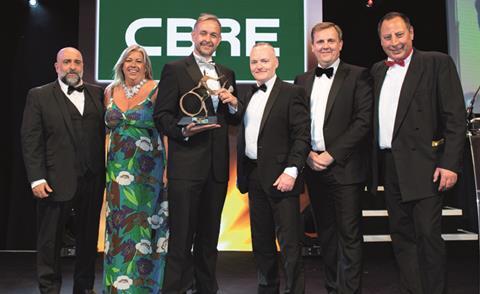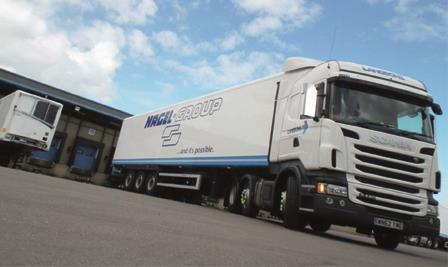
Nagel Langdons understands the value of offering top-quality training and development to new recruits, and its formal apprenticeship programme is paying dividends, for the staff and the company. But the firm’s HR director was still stunned to be handed the Apprenticeship of the Year trophy at the Motor Transport Awards 2019.
"It was such a blur. We were up against some big companies… We worked hard on our entry but did not expect to win it. So when it happened we just did not really know what was going on!” So says Michael Errington, head of HR and training at Nagel Langdons, about winning the Apprenticeship of the Year award, sponsored by CBRE, at the 2019 Motor Transport Awards, which took place at the Grosvenor House Hotel in July. “The next thing I knew, I was sat down with a big award in front of me thinking: how did this happen?”
It happened because of years of hard work and commitment to the Langdons National Apprenticeship Academy by the chilled and frozen transport specialist that is part of the Nagel Group. And it has the figures to back it up: 188 apprentices have been employed by Nagel Langdons in the past five years, including 27 LGV apprentices in 2018. Its apprenticeship programme has a 100% pass rate for LGV apprentices, and a 100% employment rate. The commitment from the business came not just from time and effort from employees at all levels, but from £200,000 invested in recruiting apprentices in 2018 alone.
“We have been working on our apprenticeship academy since 2010, when the government was asking local companies and local schools to work together,” says Errington. “We got involved in that quite heavily. We offered schools a level 2 logistics course: that was basically to encourage students to move into the logistics industry.”
Errington, who studied HR in his university days and wrote his dissertation on recruitment, is passionate about making the right connections between businesses and prospective employees – and that can start right at the beginning. “A lot of people going through school don’t really understand what the industry does and don’t appreciate it. It is undervalued. When schools are teaching children there are obvious careers such as teachers and doctors but there isn’t much exposure to transport.”
Explaining the challenges
Finding the right school-leavers for the apprenticeship programme is crucial, he explains of the success of the initiative. That means explaining that driving is a difficult job, with plenty of challenges. It is physically demanding, there are long hours and driving is a lone role – Errington believes that many younger would-be apprentices want to work in a team. Another challenge in retaining apprentices is that negative stereotypes continue to persist in some corners of the industry, which manifests in behaviour and comments that young people can find difficult to challenge.
“I am particularly keen on diversity, so we are trying to encourage women to come into the sector from an apprenticeship perspective. It’s something we encourage as much as we can,” he says.
Nagel Langdons works with Bristol-based training provider N-Gaged Training to provide driver apprentices. The two parties meet on a regular basis to discuss the progress and structure of the programme.
This includes an annual strategic meeting that evaluates business needs, how best to maximise the Apprenticeship Levy and how to deliver the apprenticeship in the year ahead.
All of this is done because having 188 people join the apprenticeship academy over the past five years has been critical to the continued success of Nagel Langdons. “You have just got to future-proof the business. Whatever that cost is, you’ve just got to accept it – because if we do not take action now, we will be on a really sticky wicket,” says Errington. “I’ve done loads of figures for the board about the age profile of the business and what that looks like.
“We are not the worst, but the majority are over 45. The percentages are reduced in the early ages and we are looking to address that. We need to find a balance between experienced people and apprentices.”
Nagel Langdons has apprentices in its sites in Bridgwater, Dover, Luton, Peterborough, Redditch, Liverpool and Barnsley. Only Bodmin and Motherwell do not have any at the moment. But getting this level of coverage is not easy, Errington explains. “In Dover the catchment area is small and we have to work hard on apprenticeships. And we have to remember there is a shortage of drivers, not just an ageing workforce.”
The business takes part in the Trailblazers scheme, which works with the government to set new standards for apprenticeships, and the format of the apprenticeship is a blend of practical and theory. “It is a standard apprenticeship,” says Errington. “They have to do English and Maths [to a minimum of GCSE grade C or equivalent] if they have not got them. Then they have to do some transport modules. There is the practical side as well as the theory side. The practical side is more based on our involvement.” It also offers training in warehousing operatives, traffic office, customer service office and team leading – as well as professional LGV driving.
Driver trainers
But it is more than just training that makes an apprentice successful.
“I have a learning and development manager who has overall responsibility for the training and underneath him is a team of driver trainers who support all the apprenticeships,” explains Errington. “We start at the beginning with them as driver buddies then we work up slowly with them until they get the licence. The driver trainers will recognise when they are capable of going out on their own.”

Once apprentices have completed the initial training they participate in the general induction programme and on-boarding that every employee goes through. Apprentices follow programmes of between 12 and 36 months, depending on the standard. All apprentices receive personal development in the form of on- and off-the-job training as well as mentor support to help them identify their own strengths and goals.
The key for Nagel Langdons is retention. “We want to make sure that the people we bring on stay, as it is the cost of not just the apprenticeship, but of people’s time in getting them in the vehicles,” says Errington. “We want them to show some passion. We want the people who have wanted to drive a truck since they were five.”
The success is feeding through to the numbers: in the past 12 months, 27 LGV apprentices have joined the programme; 100% of that first cohort have achieved their apprenticeship and 90% achieved a distinction grade.
“I started in recruitment years ago. I see it is such a vital element of bringing the right people into the business,” says Errington.
“When you get the right people in the right role, they will stay in the business. Working towards that is a real achievement. It is also good for cost saving, because if you don’t have the right criteria you’re going to be haemorrhaging money. If you get it right, you can attract the right people, especially with the way you advertise. It isn’t rocket science, it just needs a bit of attention.
“We have got a good reputation as a business to work for,” Errington adds. “We are not a massive corporate, so people are human beings, not just a number. Don’t get me wrong: we are not perfect, but then I don’t think anybody is. We do have people who leave the business, but they actually come back. They realise that the grass is not always greener. The MD, Aran Osman, is a very personable individual. He is very much about the people and getting it right, and being fair to colleagues in the business.”
Osman himself concurs, saying that Nagel Langdons is immensely proud of its National Apprenticeship Academy and it is committed to recruiting more than 40 apprentices each year. “As a significant employer with operations across the country, we have always had an underlying sense of duty to offer a progressive, vocational pathway and professional development,” he says.
“Apprenticeships provide a successful platform from which to provide a structured entry point into the business with the training, coaching and mentoring resources to develop skills and create the foundations for a mutually beneficial and long-lasting relationship between colleagues and employer.”
Errington is targeting long-term success for the academy: “We have to continue what we are doing without letting the standards slip in any way. In total, 90% of our apprentices came out with a distinction pass. We are setting the standards high. I always want things to improve and to refine what we do. The team I have behind me are all so passionate about the industry: they really want to see it succeed. We just have to ensure we carry on doing what we are doing well.”











